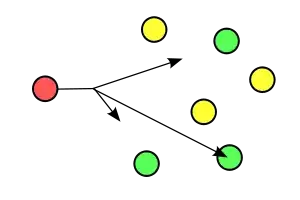There are 13 root name server addresses, each corresponding to a separate root name server system. The name server systems are not single machines - rather a collection of physical servers connected together as a distributed system. Each collection of servers is geographically distributed (a technique known as multihoming) such that a natural disaster is unlikely to affect the rest of the systems. In total, there are around 328 distributed servers directly involved.
Each distributed network that represents a root name server is addressable by a single IP address, i.e. one of the root IPs you named. This is possible through a technology called anycast, which causes traffic sent to a root name server IP to be routed to any available participating server.

Only three root name servers (B, D and H) do not use anycast.
The reason anycast is useful in DDoS scenarios is that it allows a single system to distribute traffic across multiple machines, connected via high-speed networks. This essentially acts as a way to split the DDoS into smaller chunks, where they can be dealt with more easily.
There have been two major DDoS attacks against the root name servers. The first was in 2002, where a one-hour attack caused significant problems. Following this, more root name servers moved to anycast. In 2007, a 24-hour attack caused serious problems with two name servers, and some performance issues on another two. The scale of the attack was huge, but the result was negligible for end-users.
All in all, the likelihood of anyone performing an effective attack against such a highly distributed and carefully monitored system is minimal. When combined with traditional DDoS mitigation techniques such as black-holing, anycast effectively negates flooding attacks. Since the systems are so highly distributed, physical attacks against server sites would be infeasible too.
Further reading:
